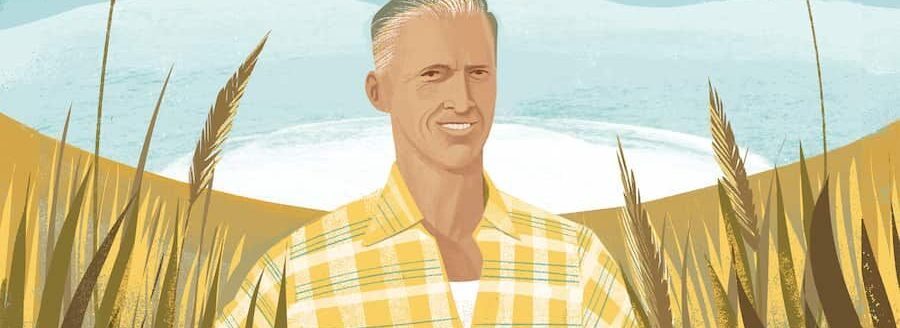Touching on yesterday is part of the charm of the heartland, yet those who enjoy visiting also know the story is not always predictable.
John Schlageck, a commentator on agricultural and rural issues for Kansas Farm Bureau, offers his thoughts in his book “Our Land, Our Lives.” The 160-page book is filled with photos and imagery that help readers better understand the Sunflower State, through the lens of a journalist who understands production agriculture and rural living.
Schlageck’s book includes a one-sentence tie to agriculture, “Like all farmers and ranchers, my life begins with the land.”
Schlageck grew up on a farm in Sheridan County. Agriculture is the state’s top economic generator and farming and ranching is found in all 105 counties in Kansas.
That is one reason “Our Land, Our Lives” stands out. While it might be easy to focus on only cattle or wheat—two products mostly closely identified with Kansas—Schlageck takes a look at the diversity of the state’s farm economy. That diversity comes from the operators who understand the value of farm work and the necessity of innovation.
Schlageck has incorporated those timeless themes throughout his book.
His words and images illustrate the elements of Mother Nature. When all is right, plentiful snow and moisture produces bin-busting crops. When she is angry, it causes great sorrow. Yet those who produce food and fiber understand the challenges.
The true beauty of agriculture is found in the caretakers who are selfless stewards and invested in local churches, schools, farm organizations and Main Streets across the Sunflower State. Schlageck captures those hearty souls who treasure their independence and recognize there is no future without community spirit.
A highlight of “Our Land, Our Values” is the emphasis on youth. The lessons learned by previous generations is passed down to boys and girls who participate in 4-H, help with farm chores and, though it might seem minor, are all an important part of bringing food and fiber to the world marketplace.
In his lifetime, he has seen how small family dairies have declined and mega-operations have grown.
Schlageck’s personal observations from his own family upbringing are touching. His late father taught him about the ups and downs of farming and ranching and the importance of grit and perseverance.
A poignant story in the back half of the book describes a trek to northwest Kansas to help with what he called “The Last Roundup.” Twenty-five years ago, the late Arnold Ottley was facing dry weather, with no grass. He chose to liquidate his cowherd. The Seguin, Kansas, man was also afflicted with cancer. Still, in Schlageck’s eyes, Ottley showed the vigor of a young cowboy as the writer, Schlageck’s father and another neighbor helped prepare for the transition.
As Schlageck recalled Ottley’s gratitude and sense of humor by saying, “You know, you did pretty good for a government man,” Ottley told the writer.
Those words meant a lot to Schlageck as he knew Ottley’s time on earth was nearing an end. It also meant he had received a compliment, something only extended when it is earned.
The book includes pages on western art and the western sport of rodeo, which are all drawn from those who work the land.
There is also a segment on grassroots involvement. His many years of working at Kansas Farm Bureau gave him an opportunity to see first hand why leadership matters—to solving land use conflicts in a peaceful manner, to state and federal farm policy. Schlageck believes engagement matters and while it may take time away from the farm, it is the only way to keep it for future generations.
“Our Land, Our Lives” is filled with beautiful photographs that remind all of us of the beauty God has shared with us. Schlageck captures the beauty in this book.
The hardcover book can be ordered at www.kfb.org/ourlandourlives for $65. Proceeds from “Our Land, Our Lives” will contribute to future agricultural leaders by funding scholarships for agricultural communications undergraduates at Kansas State University.
Sign up for HPJ Insights
Our weekly newsletter delivers the latest news straight to your inbox including breaking news, our exclusive columns and much more.
Dave Bergmeier can be reached at 620-227-1822 or [email protected].


